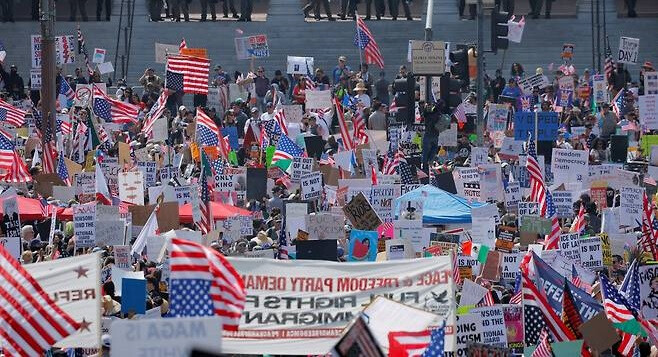
WASHINGTON D.C. – Across the United States, hundreds of thousands of citizens took to the streets on Saturday, June 14, to participate in widespread "No Kings" protests, demonstrating against what they perceive as the authoritarian tendencies and policies of President Donald Trump. These coordinated demonstrations, organized by grassroots organizations including the American Civil Liberties Union (ACLU), coincided with Flag Day and President Trump's 79th birthday, which was marked by a large-scale military parade in Washington D.C.
The "No Kings" movement, designed to counter the pomp and circumstance of the military display, drew participants from Florida to California, with rallies reported in over 2,000 locations. Organizers estimate the total turnout rivals or even surpasses the scale of the "Black Lives Matter" demonstrations seen across the U.S. in 2020. This broad mobilization underscored a deep and widespread discontent with the current administration.
Major cities witnessed significant gatherings. In Philadelphia, an estimated 100,000 people marched, while New York, Chicago, and Los Angeles also saw robust participation. Protesters voiced strong opposition to a range of Trump administration policies, including intensified immigration enforcement, perceived crackdowns on LGBTQ+ rights, the deployment of federal troops domestically, and cuts to social programs. Chants of "No Kings," "This is not Trump's birthday party," "We are governed by the people, not a king," and "Trump is an enemy of democracy" echoed through city streets, reflecting a core belief that the President's actions undermine democratic principles.
While the majority of demonstrations remained peaceful, characterized by sign-waving and chanting, isolated clashes between protesters and law enforcement were reported. In Charlotte, North Carolina, police reportedly deployed tear gas to disperse individuals attempting to breach police lines after a protest had officially concluded. Similar tensions were observed in Los Angeles, where protests against recent immigration raids saw confrontations with law enforcement, including federal agents, National Guard, and Marines.
The "No Kings" organizers articulated the purpose of their movement as a rejection of a president they accuse of seeking to project an image of absolute power. "President Trump seeks to display tanks on the streets and orchestrate a made-for-TV power show for his birthday," a spokesperson for the "No Kings" coalition stated, "but true power does not emanate from a stage in Washington; it arises from everywhere else, from the people."
Indeed, in Washington D.C., the focal point of the nation’s attention was a grand military parade. To commemorate the U.S. Army's 250th anniversary and coinciding with President Trump's birthday, the parade featured 28 Abrams tanks, 50 helicopters, and 6,700 military personnel. The spectacle, which stretched down Constitution Avenue, was a long-desired event for the President, who reportedly drew inspiration from France's Bastille Day parade in 2017. The estimated cost of the parade, ranging from $25 million to $45 million, drew considerable criticism from opponents who viewed it as an extravagant and self-serving display of military might.
Significantly, Washington D.C. was largely exempt from official "No Kings" rallies, a decision made in response to President Trump's earlier warning on June 10 that any protesters during the parade would "face a very strong response." Similarly, protests were canceled across Minnesota following a tragic incident where a Democratic legislator and their spouse were fatally shot by an intruder in their home, a decision made out of respect and concern for public safety.
The stark contrast between the celebratory military parade in the nation's capital and the widespread anti-Trump demonstrations across the country highlighted the profound political divisions currently gripping the United States. The "No Kings" movement asserts a powerful message: in America, the rule of law and the will of the people prevail, not the decree of a monarch. As the dust settles from this tumultuous day, the enduring question remains: how will these fundamental disagreements shape the future of American democracy?
[Copyright (c) Global Economic Times. All Rights Reserved.]




























